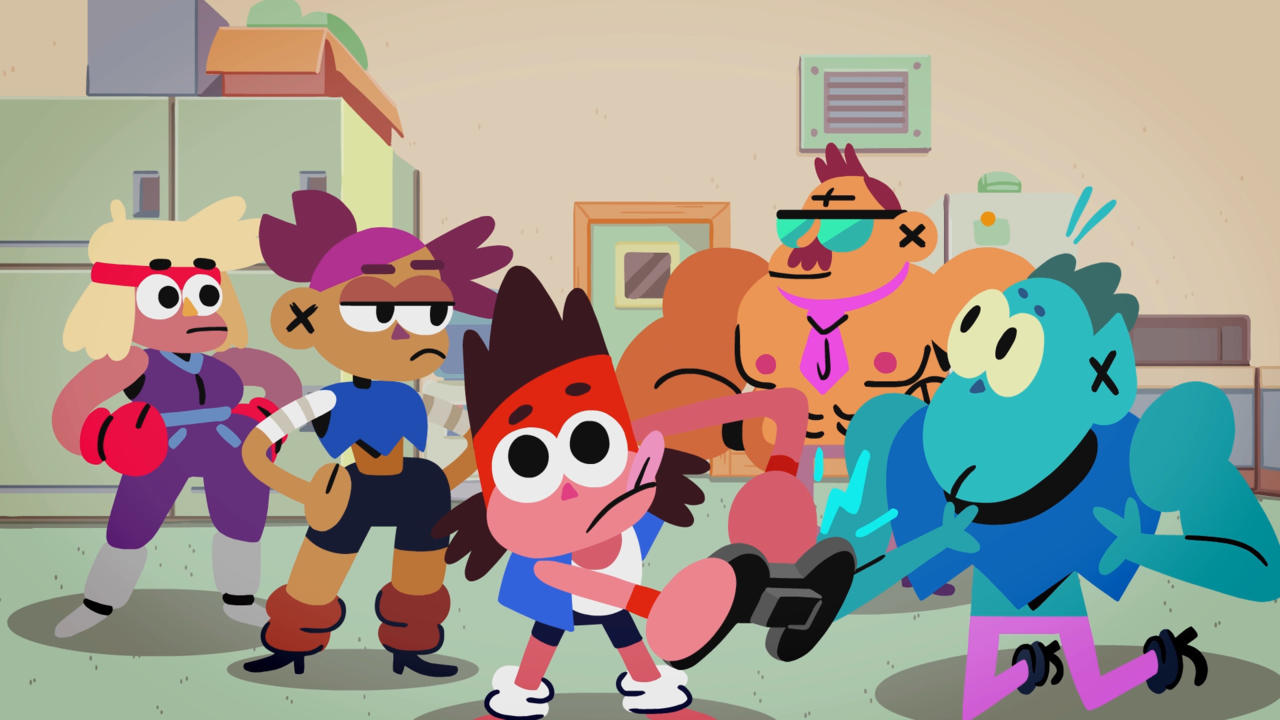With an extensive roster of quirky characters and a world that's as colorful as it is joyful, the OK K.O.! universe is the perfect playground for a video game adaptation. But while OK K.O.! Let's Play Heroes perfectly captures the show's tone and aesthetic in its own way, it is, unfortunately, let down by repetitive quests and shallow mechanics.
You play as a young boy named K.O. who aspires to be the world's greatest hero. He is aided in his journey by his delightful group of friends (such as the cool-as-ice Enid, the slacker Radicles, and the tough-as-nails Mr. Gar) who all hang out and work with him at the Lakewood Strip Mall. But when the evil Lord Boxman from across the street threatens to take down Lakewood by resetting every hero's POW card (which depicts their "hero levels") to zero, it's up to K.O. to help restore everyone's levels by beating up an endless factory line of robots. Let's Play Heroes is primarily a beat-'em-up with some simple RPG elements, such as a basic leveling system and side-quests, sprinkled in. While this helps keep the game from getting too mundane, it only partially succeeds in alleviating the tedium.
The game's beat-'em-up combat is simple but has enough variety to keep things engaging. Attacks and dodges are performed with single button presses, and advanced moves involve a few more directional changes but nothing too tricky to master. Like most beat-'em-up games, there are also a large number of super techniques, called Powie Zowies, available to unlock. As you complete each stage, you earn experience points that go towards leveling up your Strength, Agility, or Cool stats. With three attributes, there might have been potential to shape K.O. to your desired playstyle, but disappointingly, the stats only serve as a way to keep advanced moves locked until you reach certain levels.
Each enemy robot has its own unique skillset, and some battle stages have item crates containing useful weapons. These factors encourage some strategic thinking, but the limited number of enemy types and the simplistic AI means that you can win almost every battle in the same manner with the same attacks. These robot fights only become remotely challenging during boss battles, but these are few and far between.
When you are not battling robots, the rest of Let's Play Heroes involves exploring Lakewood Strip Mall and talking to the various side characters to unlock their Powie Zowies via simple side-quests. Unfortunately, most of your options are either long-winded fetch quests or battles against robots, quickly turning these tasks into a grind. The game falls into a tedious pattern of talk, fetch item and/or fight, and talk again. There are a few mini-games available, but they are generally nothing more than reskinned or tweaked versions of the game's many robot battles.

The repetitiveness also does nothing to help the game's poor pacing. Despite the high-stakes story (for the OK K.O.! universe), Let's Play Heroes plays out like a series of meandering vignettes that mostly ignore the overarching storyline, not unlike the narrative structure of the show. While that approach may work in TV, the result is a game with too much padding and little in the way of forward momentum.
What Let's Play Heroes lacks in narrative urgency and mechanical depth, it almost makes up for in its presentation. Rather than imitate the show's simple presentation, like what The Fractured But Whole did with South Park, OK K.O.! Let's Play Heroes features its own colorful interpretation of the characters and universe. In contrast to the show's static look, the game's art style is dynamic and rich in detail yet simple enough to capture the tone of the source material.
Complementing the eye-pleasing visuals is the excellent audio design, notably the soundtrack and voice acting. Each background track feels entirely in tune with the show’s whimsical tone, right down to K.O.’s adorable beatboxing. The voice cast from the show lends their talent to the game, giving Let’s Play Heroes a wonderful sense of familiarity and comfort. Writing and characterization are also top notch, and perfectly capture the quirky nature of the show. Witty one-liners, layered jokes, and meta gags are generously sprinkled throughout the game, though these sadly start to run out towards the final act. All the characters in Let's Play Heroes are well-realized, with nearly every hero and villain given enough time to shine in their interactions with K.O., all while staying faithful to their TV counterparts. It goes a long way in not only pleasing long-time fans, but also establishing character relationships and dynamics for those unfamiliar.

There is also an additional payoff for those who watch the show religiously, though it's something may frustrate newcomers: The game features a special vending machine that allows you to input secret hidden codes found within episodes of the show in exchange for POW cards that are otherwise unobtainable. While this kind of locked content is disconcerting, Let’s Play Heroes’ simplistic fighting system renders this almost unnecessary. The fact that you can easily finish the game without unlocking these hidden POW cards means the mechanic ultimately doesn’t have a significant effect on the overall experience, though it may frustrate those who want to collect every POW card in the game.
As far as adaptations go, OK K.O.! Let's Play Heroes looks and sounds fantastic in a way that is distinct yet faithful to the source material. But the shallow mechanics, the repetitiveness of the gameplay loop, and narrative pacing issues prevent the game from being a rousing knockout.







